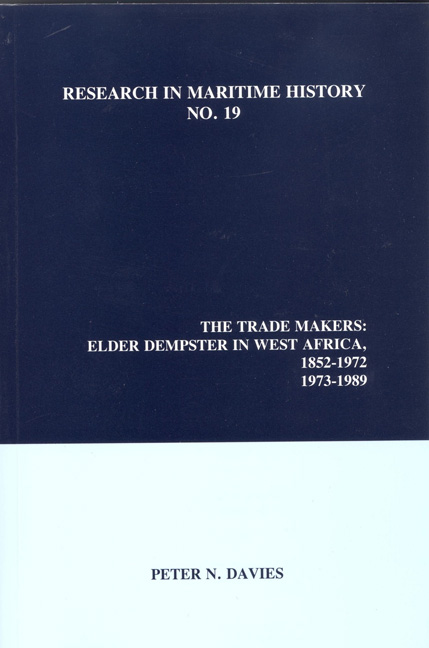Book contents
- Frontmatter
- Table of Contents
- List of Illustrations
- Foreword
- Introduction (Second Edition)
- Foreword
- Preface
- Acknowledgments
- Introduction to the Original Edition
- Frontispiece
- Part One The Pioneers
- Part Two Elder Dempster And Company
- 3 Alfred Lewis Jones
- 4 The West African Shipping Conference
- 5 Expansion and Diversification
- 6 The Effects of the Conference System
- Part Three Elder Dempster And Company Limited
- Part Four Elder Demster Lines Limited
- Part Five The End Of An Era
- List of Appendices
- Appendices
- Bibliography
- Index
5 - Expansion and Diversification
from Part Two - Elder Dempster And Company
- Frontmatter
- Table of Contents
- List of Illustrations
- Foreword
- Introduction (Second Edition)
- Foreword
- Preface
- Acknowledgments
- Introduction to the Original Edition
- Frontispiece
- Part One The Pioneers
- Part Two Elder Dempster And Company
- 3 Alfred Lewis Jones
- 4 The West African Shipping Conference
- 5 Expansion and Diversification
- 6 The Effects of the Conference System
- Part Three Elder Dempster And Company Limited
- Part Four Elder Demster Lines Limited
- Part Five The End Of An Era
- List of Appendices
- Appendices
- Bibliography
- Index
Summary
Extension of Elder Dempster's Interests
The establishment of the West African shipping conference in 1895 and the subsequent acquisition of the fleet of the African Association placed Alfred Jones in a position to control the external communications of British West Africa. The way in which Jones extended this power and the limitations on his authority must now be examined.
From the start of his association with Elder Dempster Jones had felt that if he could control or own the ancillary services on the coast it would be both profitable and prudent. He therefore made every effort to acquire the boating companies belonging to the merchants; he developed a series of branch lines to facilitate the movement of cargo to the better loading-ports; he invested in innumerable projects designed to provide essential services; and he created a credit and banking structure that allowed trade to expand without undue hindrance.
The boating companies were a prime objective. These had sprung up because of the difficulties experienced by deep-sea ships in landing their cargoes on the almost harbourless coast of West Africa. In many places the “port” was nothing more than an open roadstead, and cargo and passengers had to be carried through the surf by small boats manned by the local natives. These local boats proved to be inadequate in many instances and so the loading and unloading of cargo was a very slow process. Accordingly it became profitable for merchants to set up their own boating concerns, and they built or purchased suitable surfboats and provided men to crew them. In other places the shipping companies themselves established boating organizations and Jones was quick to see the advantages of obtaining control of as many of the merchants’ facilities as he could. He realised that a series of integrated boating companies would not only assist in the rapid loading and discharging of his ships, but it would also be an ideal method of preventing competitors from gaining a foothold in the trade. The majority of the merchants appear to have been quite content to sell their boats to Elder Dempster so long as they were assured of an efficient service.
- Type
- Chapter
- Information
- The Trade MakersElder Dempster in West Africa, pp. 79 - 108Publisher: Liverpool University PressPrint publication year: 2000

